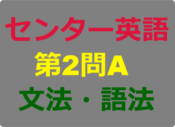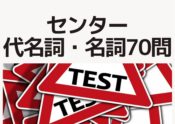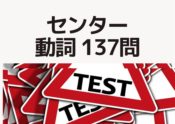センター英語は形式主語より形式目的語がお好き!最頻出英文法04

大手予備校で中1から高3の基礎クラスから東大クラスまでほとんどのクラスを担当しました。映像授業にも多数出演経験あり。
元東海大非常勤講師。
「大学入試英語解く得!」は最高PV数 34,212 / 日
質・量ともに日本一分かりやすい大学入試英語対策ページを目指します!
資格:英検一級、通訳案内士(英語)、TOEIC950点
趣味:海外旅行、食べ歩き
特技:将棋アマ六段 (全国レーティング選手権優勝 1998)
元技術翻訳者、元富士通
センター英語はもちろん形式主語=仮主語も出題されますが、特に形式目的語=仮目的語を好む傾向があります。特に整序英作文では超頻出ですよ。
形式目的語は使う動詞も限られているし、奥は深くないので今回はその全貌を記事にしました。
今回の内容
1. 形式(仮)目的語とは?
1-1 形式主語をおさらい
英語では形式主語などを使い長い句や節は文末に移動させることが多いですね。
It is difficult to persuade her.
彼女を説得するのは難しい。
「それは難しい」という始まりですが、It = to persuade her で、Itを形式主語(仮主語)、to persuade her の部分を真の主語(本当の主語)などと言います。
もちろん形式主語を使わずに
To persuade her is difficult.
でも同じ内容を表します。
1-2 形式目的語の特徴
形式目的語は目的語の位置にitがくるだけで、考え方は仮主語とそっくりです。
I found it difficult to persuade her.
「私はそれが難しいと分かった」という始まりですが、it = to persuade herで、itを形式目的語(仮目的語)、to persuade her の部分を真の目的語(本当の目的語)などと言います。
また形式目的語構文には以下のような特徴があります。
【 形式目的語構文の特徴 】
①文型はSVOC
②真の目的語はほとんどto Vかthat節
①文型はほぼSVOCだと言い切って良いでしょう。裏を返すとSVOCを取ることの多い動詞は仮目的語と相性が良いです。
②目的語=名詞の代用なので名詞句か名詞節が続く訳ですが、名詞句ならto V、名詞節ならthat節がほとんです。もちろん名詞句を作る動名詞や、名詞節を作る疑問詞節が続くこともあります。
2. 形式目的語を取ることの多い動詞
【 形式目的語を取ることの多い動詞 】
①「思う」系の動詞 find, believe, consider, think, suppose
②「知覚動詞」のhear, feel / leave, owe など
③SVOCの王様make
理論的にはSVOCを取る動詞なら形式目的語を取ることが可能なはずですが、実際に形式目的語構文で見かけるのはこれらの「いつもの動詞」ばかりです。
特に「思う系」の動詞はSが「~だと思う」ことに加えて「OがCだと思う」事を言いたい性質から、SVOCを取ることが多い動詞です。「思う系」の動詞が仮目的語の本命です。
I think it important that we should do our best.
自分たちが全力を尽くすことが大切だと思う。
I found it interesting to read this book.
私はこの本を読むことは楽しいと分かった。
3. 形式目的語を取る慣用表現
【 形式目的語を取る慣用表現 】
①make it a rule to V 「Vすることにしている」
②hear it said that ~ 「~と言われるのを耳にする」
③see to it that ~ 「~するよう気をつける」
これらは熟語として習うこともある慣用表現です。
①は「Vすることを決まりごと(rule)にしている」→「Vすることにしている」
②は「~と言われているのを聞く」→「~と言われるのを耳にする」
で理解しやすいと思います。
I make it a rule to switch off my mobile phone when I’m on the train.
私は電車に乗ると携帯電話の電源を切るようにしている。
We often hear it said that the Japanese are a diligent people.
日本人は勤勉な国民だと言われるのをよく耳にする。
③は意外と盲点になる形。普通は他動詞のseeにto続く例外的な形なのでしっかり覚えており必要があります。
「~をよく見ておく」→「Vするよう気をつける」という感じでしょうか?
We’ll see to it that you get home early.
君が早く家に帰れるように気をつけます。
4. 形式目的語で使うことの多い表現
【 形式目的語で使うことの多い表現 】
take it for granted that ~「~を当然のことと思う」
owe it to 人 that ~「~は人のおかげだ」
leave it to 人 to V 「Vするのを人に任せる」
これらの表現は単語一言で言えるような場合は形式目的語を使うとは限りません。
We take air and water for granted.
我々は空気や水を当然のものと考えている。
でもなかなかair and waterなどと一言では言えない場合は形式目的語に頼ることになります。
I took it for granted that we were free to use the school gym on Saturdays.
土曜日の学校の体育館を自由に使えるのは当然だと思っていた。
(センター2012 本試験 実際は2Aでgranted を問う問題)
I owe it to you that I have succeeded.
僕が成功したのは君のおかげだ。
次に仮目的語のセンター英語の過去問ですが、基本を抑えておけば簡単だと思うでしょう。
You will find it easy to solve the problems about a formal object which appeared on National Center Test.
5. センターに出た!形式目的語
1. Keita: You have so many things in my room.
Cindy: I know. Actually, ( )( )( )( )( )( ) it neat and clean.
【 ①difficult ②find ③it ④I ⑤keep ⑥to 】
(センター2017年 本試験)
2. “Did you install that computer software you bought last week?” – “Yes. And ( )( )( )( )( ) use.”
【 ①easy ②finding ③it ④I’m ⑤to 】
(センター2012年 本試験)
3. Some people find ( ) difficult to economize on mobile phone costs even when times are hard.
①everything ②it ③that ④things
(センター2011年 本試験)
4. Does having picture on a menu ( )( )( )( )( ) to order?
【 ①to decide ②what ③make ④easier ⑤it 】
(センター2005年 本試験)
5. Everyone thought ( )( )( )( )( ) to look the door when you went out.
【 ①of ②you ③it ④to forget ⑤very careless 】
(センター2002年 追試験)
6. Alan gave up his job as ( )( )( )( )( ) with his boss.
【 ①found ②he ③impossible ④it ⑤to work 】
(センター2001年 追試験)
6. センターに出た!形式目的語-解答
1. Keita: You have so many things in my room.
Cindy: I know. Actually, ( )( )( )( )( )( ) it neat and clean.
【 ①difficult ②find ③it ④I ⑤keep ⑥to 】
(センター2017年 本試験)
正解 ④②③①⑥⑤
I find it difficult to keep it neat and clean.
部屋をきちんと綺麗にしておくのは難しいということが分かるわ。
2. “Did you install that computer software you bought last week?” – “Yes. And ( )( )( )( )( ) use.”
【 ①easy ②finding ③it ④I’m ⑤to 】
(センター2012年 本試験)
正解 ④②③①⑤
・ここでは動詞が進行形になっています。
“Did you install that computer software you bought last week?” – “Yes. And I’m finding it easy to use.”
使うのが簡単だと分かってきているところです。
3. Some people find ( ) difficult to economize on mobile phone costs even when times are hard.
①everything ②it ③that ④things
(センター2011年 本試験)
経済的に苦しいときでさえも、携帯電話の費用を節約するのは難しいと思う人もいる。
4. Does having picture on a menu ( )( )( )( )( ) to order?
【 ①to decide ②what ③make ④easier ⑤it 】
(センター2005年 本試験)
解答 ③⑤④①②
Does having picture on a menu make it easier to decide what to order?
・what to order「何を注文すべきか」
メニューに写真が載っていれば、何を注文するか決めるのがもっと容易になりますか。
5. Everyone thought ( )( )( )( )( ) to look the door when you went out.
【 ①of ②you ③it ④to forget ⑤very careless 】
(センター2002年 追試験)
解答 ③⑤①②④
Everyone thought it very careless of you to forget to look the door when you went out.
・careless of you は you = careless の関係がある。
外出する時にドアに鍵をかけるのを忘れるとは、あなたはとても不注意だったと誰もが思った。
6. Alan gave up his job as ( )( )( )( )( ) with his boss.
【 ①found ②he ③impossible ④it ⑤to work 】
(センター2001年 追試験)
解答 ②①④③⑤
Alan gave up his job as he found it impossible to work with his boss.
アランは、上司とうまく一緒に仕事をすることができないとわかったので仕事を辞めた。
できましたか?簡単だったでしょう?形式目的語についてはもうこれ以上言うことはほとんどないくらいです。
形式目的語はなぜか形式主語より苦手な生徒が多いので、得意にしちゃいましょう!
 しげT
しげT
大手予備校で中1から高3の基礎クラスから東大クラスまでほとんどのクラスを担当しました。映像授業にも多数出演経験あり。
元東海大非常勤講師。
「大学入試英語解く得!」は最高PV数 34,212 / 日
質・量ともに日本一分かりやすい大学入試英語対策ページを目指します!
資格:英検一級、通訳案内士(英語)、TOEIC950点
趣味:海外旅行、食べ歩き
特技:将棋アマ六段 (全国レーティング選手権優勝 1998)
元技術翻訳者、元富士通





